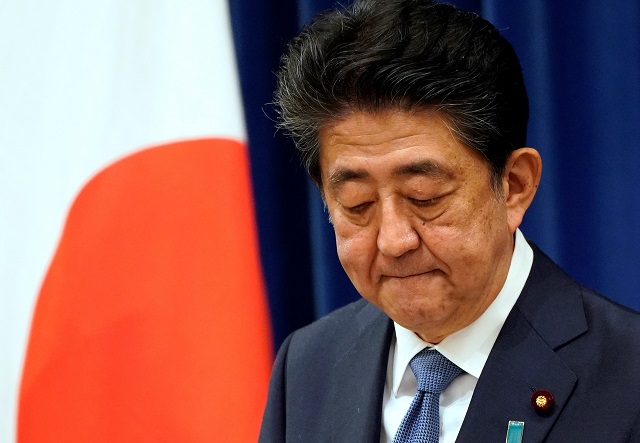
Tokyo, Japan | XINHUA | Japanese Prime Minister Shinzo Abe on Friday announced his resignation over health issues, catching the country by surprise and sending two major stock indexes tumbling in Tokyo.
Japan’s economy is already in deep recession amid the COVID-19 pandemic, and the sudden resignation of the prime minister, who led the country’s economic recovery through “Abenomics,” has added further uncertainty.
In December 2012, Abe took office for the second time and launched ultra-loose monetary policy, proactive fiscal policy and a series of structural reform measures to boost the Japanese economy. Guided by “Abenomics,” Japan’s economy was on the path to slow recovery, leading to a sharp rebound in the stocks and real estate markets.
However, according to the Economic and Social Research Institute of the Cabinet Office, the phase of economic expansion started by “Abenomics” ended in October 2018. The 71-month recovery period has become the second longest since World War II.
But the ultra-loose monetary policy under “Abenomics” has neither helped Japan out of deflation to reach the 2-percent inflation target, nor has it significantly boosted the development of Japan’s real economy. For the Japanese media, economists and people, years of around 1-percent economic growth has done little to boost their confidence, and they “lacked a real feeling” of economic recovery.
Since the outbreak of COVID-19, Abe’s cabinet has rolled out an unprecedented economic stimulus package to counter the economic fallout. With the state of emergency fully lifted, the stimulus package is delivering results as the country’s economy appears to be hitting the bottom and is in the course of recovery.
But most experts believe that the recovery would be very slow as Japan’s economy lacks momentum due to weak domestic and external demand.
According to the latest data, Japan’s economy shrank 7.8 percent in the second quarter of 2020 compared to the first quarter, or at an annualized rate of 27.8 percent, logging the sharpest contraction on record.
The data also showed that the country’s personal consumption remained sluggish, while the recovery of industrial and mining production was still weak and exports were far from a full recovery.
Takahide Kiuchi, an economist at Nomura Research Institute Ltd, said that Japan’s economy shrank at a record pace in the second quarter, with 60 percent of which coming from a sharp drop in personal consumption.
As the employment environment deteriorates and income decreases, consumption is expected to continue to be bleak in the future, said Kiuchi, adding that demand for durable goods such as automobiles will be delayed, and service industries such as catering and entertainment will still face severe challenges.
All these factors will weigh heavily on the recovery in the third quarter and beyond, with very little prospect for a “V-shaped” recovery of the economy, according to the economist.
In such a grim economic situation, Abe’s sudden resignation will undoubtedly bring new uncertainty to the country’s economy. On the one hand, it is hard to predict whether the new prime minister will follow Abe’s path. On the other hand, the waning “Abenomics” also leaves too many unanswered questions for his successor.
In addition to the COVID-19 outbreak, various economic and social issues such as market shrinkage, labor shortage and social security pressure brought about by negative population growth is and will be dragging the Japanese economy for a long time. Therefore, the new leader will face a great challenge of structural economic problems.
******
XINHUA
 The Independent Uganda: You get the Truth we Pay the Price
The Independent Uganda: You get the Truth we Pay the Price





